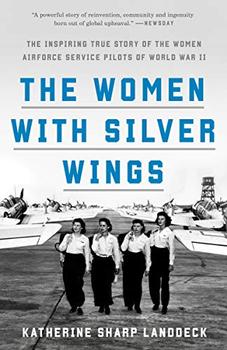Summary | Excerpt | Reading Guide | Reviews | Beyond the Book | Readalikes | Genres & Themes | Author Bio

The Inspiring True Story of the Women Airforce Service Pilots of World War II
by Katherine Sharp LanddeckChapter One
Airminded
Only a few short weeks after the attack on Pearl Harbor, Teresa James stood on the freezing platform of Pittsburgh's Union Station saying goodbye to the love of her life. They were an attractive couple: Teresa a pretty, curly-haired brunette with brown eyes and a ready smile, and George—who went by Dink—looking so handsome and clean-cut in his new uniform, with his cropped hair and square jaw. The couple had been preparing for this moment ever since America's entry into the war, but even so, they hated that the time for goodbye had come so soon.
Both Teresa and Dink had spent years anxiously following the news, waiting for the moment when their country might finally join the fight. They were children of European immigrants—Teresa's mother was from Ireland and Dink's was from Hungary—and perhaps, as a result, they took events overseas personally. Dink was a well-qualified pilot with 2,100 hours of flying time, and the Army's Air Transport Command wanted him to join their Ferrying Division. But by the time the telegram from the Ferrying Division arrived, he had already gone with a friend and enlisted. He was now Private Martin, headed to training at Keesler Army Airfield in Biloxi, Mississippi.
Seasoned pilots like Dink were in high demand in January 1942. A sleeping nation had finally woken up to the fact that America was woefully underprepared for war. In the weeks that followed Pearl Harbor, the nation's military began a fevered rush to train and recruit new personnel, especially pilots. It was clear that this new conflict was going to be fought, and won, in the air. In the years since the end of World War I, advancing airplane technology had transformed the nature of armed conflict, with newly developed combat aircraft enabling both sides to enact swift and deadly violence. In particular, the might of the German air force—the infamous Luftwaffe—drew the awe and respect of all who knew airplanes. In order to counter it, the United States would not only need to train thousands of pilots to fight overseas but also to manufacture and deliver aircraft in vast numbers.
Across the country, pilots were being called up to serve. Many didn't wait to be asked and, like Dink, simply enlisted. These patriotic Americans came from every state in the nation, from every race and social class. But they had one thing in common. They were all men. In 1942, the draft applied only to males ages twenty-one to forty-five, and while the military did recruit women volunteers as nurses and for other positions, it did not admit them as pilots.
On the icy train platform, Teresa and Dink said their goodbyes and promised to write. Teresa wanted to know all about Dink's training. After all, she was an accomplished pilot in her own right, well-known for her stunt flying, which she had only recently given up to make her living as a flight instructor. Teresa had been flying for nine years, during which time she had amassed almost 1,200 hours in the air, teaching scores of young men to fly and to improve their flight skills in preparation for war.
The couple had met on the airfield in 1937. Dink noticed Teresa right away, but it took him a while to pluck up the courage to ask her out. Then, one summer day all flying stopped for a sudden rainstorm. Dink took the opportunity to invite Teresa over to his family home for lunch. That day they spent time talking and getting to know each other. Teresa always asked her new students if they were good dancers: she had a theory that people who were light on their feet would likely turn out to be light on the airplane controls as well, making them good pilots. Teresa soon learned that although Dink couldn't jitterbug, he loved to slow waltz with her and that he was a natural in the air. She had met her match.
After Dink's departure, Teresa went back to work as an instructor, but the busy airfield now felt lonely. The year before, Teresa had helped to set up a local division of the Civil Air Patrol, a civilian auxiliary organization that was preparing to surveil the surrounding area from the air in the event of war. Although she continued to volunteer for work in the air patrol, Teresa felt at loose ends. She wished she could do more. She missed Dink terribly. The couple wrote to each other, sending letters back and forth daily.
Excerpted from The Women with Silver Wings by Katherine Sharp Landdeck. Copyright © 2020 by Katherine Sharp Landdeck. All rights reserved. No part of this excerpt may be reproduced or reprinted without permission in writing from the publisher.
Read the best books first, or you may not have a chance to read them at all.
Click Here to find out who said this, as well as discovering other famous literary quotes!
Your guide toexceptional books
BookBrowse seeks out and recommends the best in contemporary fiction and nonfiction—books that not only engage and entertain but also deepen our understanding of ourselves and the world around us.